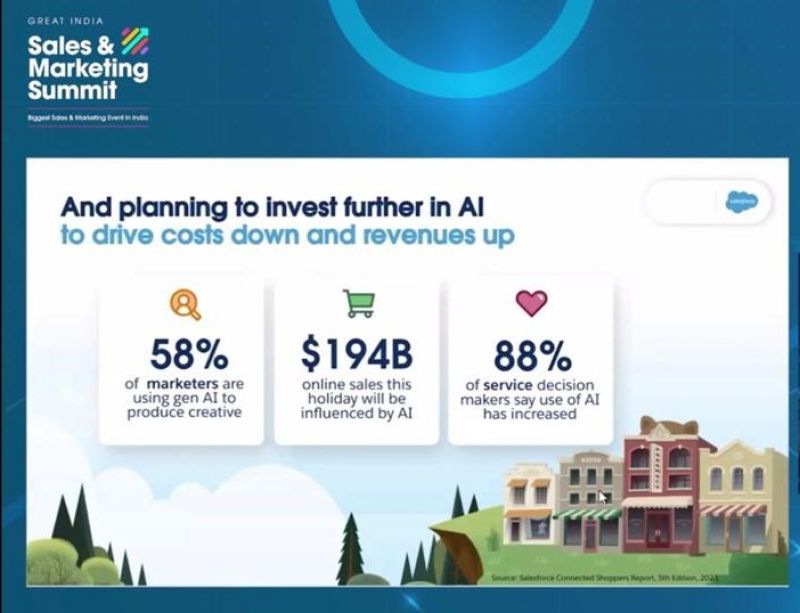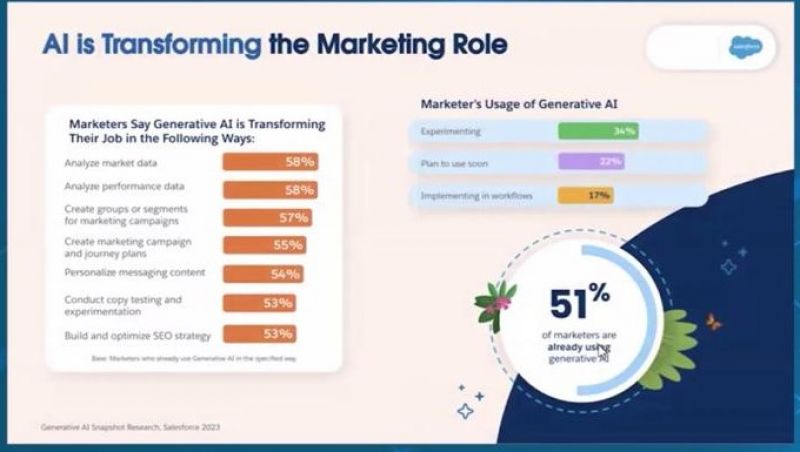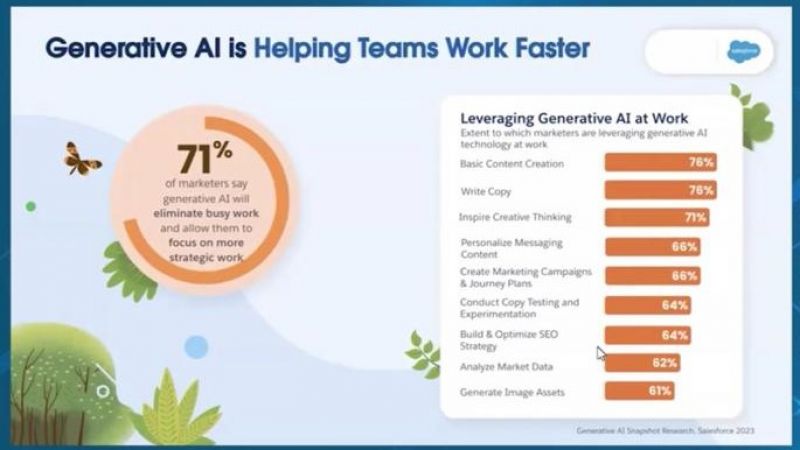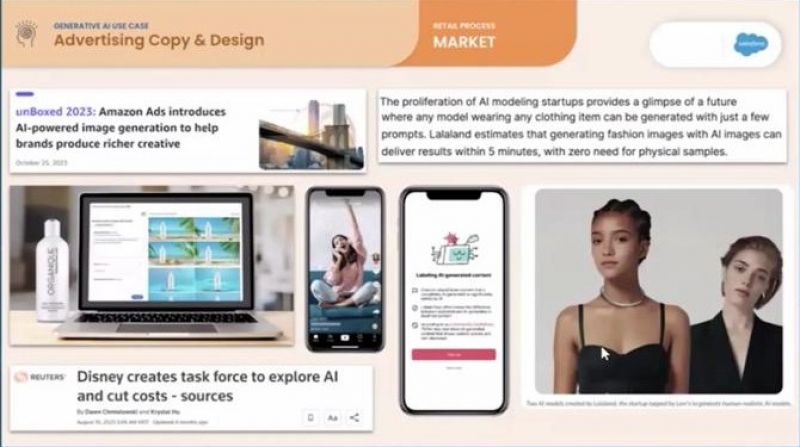Sridhar Hariharasubramanian, senior director, solution engineering, Salesforce discussed the potential of generative AI to transform marketing in the years to come, at Salesforce’s Great India Sales and Marketing Summit held virtually on Friday, 24 May.
He also shed light on the challenges of ensuring the accuracy and originality of generated content, while emphasising the importance of leveraging it to deliver superior customer experiences.
Quoting Amazon CEO Andy Jassy, who in December 2023 stated on CNBC Mad Money that Generative Al is going to change every customer experience and there's going to be a lot of 'societal good' Sridhar, chose to make the case for the ‘fence sitters’ who were still sceptical about the potential of generative AI.
“If you've studied generative Al and you're still scoffing, you're not paying attention,” he quoted Jassy, underlining that the time is right to get into understanding the potential of Generative Al.
Understanding Generative Al
While AI, which is a convergence and evolution of technologies such as machine learning, deep learning, and computer vision, has been around for some time (since 1960, he stated, when the term ‘artificial intelligence’ was coined), generative AI changed the world last year when OpenAI came out with ChatGPT, Sridhar opined. “In some way, it made access to deep, sophisticated technology available to any person who has access to the internet.”
"What Gen AI essentially does is that it learns from the underlying data that you feed the multi-modal models, which is not limited to the existing data points, so that it can recognise certain patterns based on explicit inputs that you provide, and can provide a response that is unique and diverse, in a quick fashion," he said.
"Today gen AI applications span multiple industries, with almost every other industry having begun to leverage the power of the technology," he added.
Citing numbers from reports, he shared: 58% of marketers are using Gen Al to produce creative, USD 194 billion online sales this 'holiday season' will be influenced by AI, 88% of service decision-makers say use of AI has increased
Several enterprises and companies around the world have jumped on to the bandwagon in recent times to deploy it to improve employee productivity, customer experience and a whole host of other use cases that are relevant to their organisations, the speaker noted.

“Now, a lot of enterprises and companies around the world have already jumped onto this bandwagon and are making huge investments to try out these technologies and deploy them to improve employee productivity, to improve customer experience and a whole host of other use cases that are relevant to their company and their organisation,” said Sridhar.
He noted that from their surveys and reports, they have been able to gather the ‘nominal benefits’ that enterprises are seeing by adopting these technologies, and what they are getting out of all these investments: It helps marketers be more productive, It has resulted in greater number of online sales and revenues from online channels, and, the service decision and also the customer satisfaction has improved a lot because of these technologies.
The Evolution of Al in marketing and retailing
Diving into marketing more specifically, the speaker spoke about how generative AI can make a difference by making marketers more productive and creative.
Emphasising that there is no doubt that this tech is going to make a big difference in the years to come, Sridhar said, “Our surveys have indicated that this technology is transforming marketing in a variety of ways, in terms of analysing data, analysing the performance of campaigns after you execute them, to create groups and segments and very granular level so that you're able to send personalised campaigns to them.”
They also asked marketers, where they are in the adoption lifecycle, to find that a lot of them are still in the experimental stage.

“We believe that generative AI can be a great personal assistant for marketers”, he said.
He added, “If you look at some of the jobs to be done as a marketer, obviously a lot of those jobs today, are done either manually or with some tools and solutions and so on. We believe that there is a tremendous opportunity for marketers to increase the opportunities for personalisation or rather, go into extreme or hyper personalisation as we like to call it.”
Continuing to delve into ways to improve marketing using Gen AI tools, he said, “Eliminate over-communication. This is always a problem for us as consumers when we receive unnecessary messages from our marketers or brands that we love, but those messages are just not relevant to me. So how do we stop that and, of course, increase customer experience across the entire journey overall?”
Sridhar shed light on how companies that have already adopted generative AI are using it in a variety of ways: It is being used to create content, write copy, inspire creative thinking, and so on.

He went on to its usage in advertising copy and design as a use case. “The challenges, of course, are that there is a lot of complexity and constraints. And whenever you put out something it has to be relevant to the audience that you're trying to target and attract. It also has to be personalised to the ‘consumer interests’ to some extent, especially if it is online,” he noted.
And therefore, this technology, especially in this particular use case, has a lot of promise, he pointed out.
“These sort of tasks such as creative content generation, personalisation at scale- these are all fantastic use cases or applications for technologies such as data-driven, generative AI. And I'm sure you're already seeing a lot of this appear in the real world in mainstream advertisements when you go to various social media sites on the internet,” he said.
Sridhar also delved into ‘AI modeling’ wherein an AI-generated avatar poses as a model not far in the future.
“But in today's world what is happening is you could have a human model wear 10 different types of clothing in 10 different colours, it can be done very easily within a matter of few minutes, with zero need for ‘physical samples’ of those colours. That apparel or whatever the case may be, can be digitally draped on a human model, and you can then use it to personalise.”
Explaining his point, he continued, “So, let's say for example, I come to a website, and my preferred colours are pink and orange. Maybe the marketer can show me models who are wearing those kinds of colours so that it appeals to me a lot more.”
"The other part of this is that, while it provides a great experience, it also cuts down on the time that is required to put out these kinds of campaigns. “The time needed is going to be much shorter than when you do it in a manual way, where the model had to wear 10 different types of clothes, take photographs, retakes and so on,” he added.
Whom does AI-generated content belong to?
While we see companies using generative AI extensively for actual image creation, one has to be careful about infringing on copyrights, Sridhar cautioned. So, whom does this content belong to?
“Many of these tools are trained on publicly available data, but whether your content is coming from a legitimate source is something that you may have to check before you put it out to your consumers,” he said.
The last one is to write the ads and the copy in the ad itself by generative AI. While generative AI still has a long way to go in terms of writing exactly like a human, rapid progress has been made, the Saleforce director stated.
He explained, “Where one gives it a prompt with some clues and some expectations and asks generative AI to fill in the blanks, and that blank can be served as a personalised way to reach different customer bases.”

Leveraging Gen AI resources to deliver fantastic customer experiences
Personalised marketing has caught the attention of audiences around the world. Today expectations are already built into the minds of consumers that when a promotional offer or a coupon is made, or even when seeing an ad, that content is something that should be very relevant to them. Generative AI can come to the rescue of marketers here as well, Sridhar emphasised.
“Because you have to do this at scale, right? How do you do personalisation at the scale of a one-to-one, because my expectation could be very much different from someone else's expectation. This is another thing that technology is very ideally designed to do. In the good old days, people used to write SQL code to generate segments or cohorts and send relevant information. But now we are at an age where, just by speaking natural language and describing the segment of the cohort that you want to be generated, these tools can generate them and there is absolutely no technical knowledge that is required to do this. And therefore, it is a marketer’s best friend today,” he declared.
“At the end of the day, it also leads to more effective marketing, ROI and reduced spends. So, that is something that marketers love," he added.
He then went on to delve into the last but not least significant use case about 'delivering great experiences' to create 'loyal customers who go beyond loyalty to customer advocacy'.
“That can happen only when superior experiences are delivered to them in a very consistent and frequent manner,” he said, noting that Generative AI, through all the insights and the intelligence that it can provide can be a great tool for marketers to deliver those experiences via both offline, as well as, online channels.













